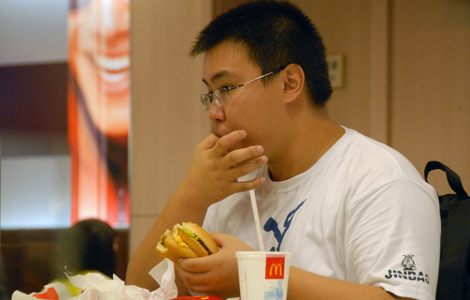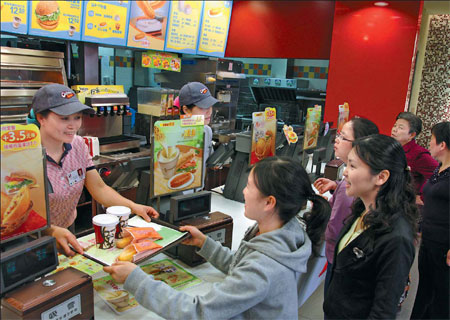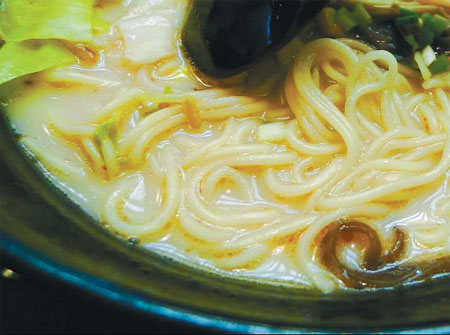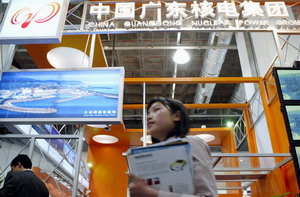Some foreign fast food is harder to swallow
Updated: 2011-08-15 16:03
By Zhang Yuchen (China Daily)
|
|||||||||||
|
 |
|
A customer at a McDonald's in Beijing's Chaoyang district on Sunday.?[Photo / China Daily] |
Problems with major brands raise public concern over safety, Zhang Yuchen reports in Beijing.
Cheng Qizheng, 19, is a loyal fan of KFC, McDonald's and other foreign fast food. He grew up frequenting their shops, believing their products to be clean and trustworthy.
But doubts raised on Weibo dented the confidence of Cheng and many others.
The quality of the soybean milk at KFC was called into question. So were the burgers at McDonald's and the soup at Ajisen Ramen, a popular Japanese noodle shop.
Food safety was an issue in just one of these cases. The other two involved marketing claims and whether consumers thought the products were as good as advertised.
But people can be unforgiving because food safety is such an important issue.
"We do have food safety problems, but not as many as people think. And not every problem in the food industry is about the safety of the food," Chen Junshi, senior research professor at the National Institute of Nutrition and Food Safety, said.
KFC's problem started on July 28. A Sina micro-blogger writing under the name Fu Xiaoxiao Ki published a photo of boxes of soy milk powder piled outside a KFC outlet in Guangzhou, capital of South China's Guangdong province.
"Even street vendors' soybean milk is freshly ground. How can KFC sell it at such a high price when it is actually made from the powder? I feel cheated," the post read. It was reposted 30,000 times in one day and followed by extensive media coverage as well as the interest of food safety authorities.
KFC acknowledged on its website on July 29 that its soy milk is made from powder. But it also said the powder's Chinese producers follow KFC's special recipe, which makes sure the milk tastes similar to milk from freshly ground soybeans.
|
 |
|
Customers line up at a KFC shop in Shijiazhuang, capital of North China's Hebei province. The chain's soybean milk, provided only to the Chinese market, is not made from fresh-ground beans, although many customers thought so.?[Photo /? China Daily] |
On Thursday, Beijing's health authorities announced that they had inspected KFC's 254 restaurants in the capital. They determined that the soy milk KFC sells is not made from freshly ground beans, but it is safe.
Bread and soup
On Aug 1, a photo appeared on the popular Mop social networking website that showed burger buns, some in ripped wrappings, piled in the sun outside a McDonald's restaurant in Beijing. The picture was reposted hundreds of thousands of times.
This was the food safety issue. The open wrappings could allow flies or vermin into the packages of bread.
McDonald's later announced that it had punished the restaurant - responsible employees lost their jobs - and that the buns would not be used.
 |
|
Ajisen Ramen's popular noodle soup meets the Japanese brand's standards, but not those of many customers, who believed the broth was made from scratch at each restaurant in the chain.?[Photo / China Daily] |
Ajisen Ramen, a Japanese noodle brand with 5,900 outlets on the Chinese mainland, is the biggest loser in this round of mistrust. Its much-advertised noodle soup was discovered to be made from a concentrate produced in East China's Shandong province, not freshly made at each outlet as many customers believed.
When the word spread, customer levels dropped sharply, local media reported. The parent company's stock prices on the Hong Kong exchange plunged more than 40 percent from July 27 to Aug 5. Trading was suspended on Aug 8.
Advertising claims
Misleading or ambiguous advertisements lie behind foreign fast foods' trust problems in China.
"In the case of Ajisen Ramen, the advertisement obviously advises customers wrongly," said Qiu Baochang, a lawyer specializing in consumer rights at the Beijing Lawyers Association. "The consumers' right of being informed has been violated. This is cheating."
When checked on Sunday, the company's website refers to "Ajisen Ramen's exclusive soup base ... a broth of pork bones simmered to perfection". Some readers might misunderstand, but soup base by definition is a concentrate of broth.
It also says the white soup base "is full of 'natural collagen' ... (which) helps the renewal of skin and bone tissues such as cartilage and tendon, and is the richest form of protein in animals".
The Shanghai Food and Drug Administration reported on Aug 2 that the soup is made using a dehydrated broth made with pork bones that is produced by a factory in Tai'an, Shandong province.
The same day, the Shanghai Administration for Industry and Commerce said it was investigating the amount of calcium in the soup. Ajisen Ramen's menu says each bowl of soup contains 1,600 mg of calcium, "four times that of milk" and "10 times that of meat". Results have not yet been announced.
As for KFC, its television advertisement says the soy milk is "made in the ancient way" and "tastes nice and pure". The company never said the soybeans were freshly ground.
However, "the advertisement lures the consumer to believe the soybean milk, with its pure taste and flavor, is freshly ground", Qiu said. "The company did not mean to clearly tell what exactly the soybean milk is made from."
Neither Ajisen Ramen nor KFC answered China Daily's questions about its advertisements.
A sensitive public
The soy milk, ramen soup and burger buns are able to prompt such reactions because the Chinese have high expectations for the quality of foreign fast foods.
"Part of the reason Western brands are so successful is that people trust they won't cut corners like so many domestic brands do," said Shaun Rein, managing director of China Market Research Group in Shanghai.
Cheng, the fast food fan, agreed. Speaking of KFC and McDonald's, he said: "I like their restaurants, where foods are safe and brands are attractive. I know fast foods are not nutritionally balanced, but I seldom think about it."
Chinese people do think about food safety, however, especially following scandals such as the tainting of milk and powdered baby formula in 2008 with the toxic chemical melamine. Even a tiny suspicion may cause serious doubts, marketing experts say.
Food and product safety was the biggest concern for Chinese consumers, ahead of paying for medical bills or children's education, according to a survey of 5,000 consumers in 15 cities by Rein's group last year. Those concerns continue to be high on the agenda because of regular allegations that food companies and restaurants are using poor-quality ingredients, Rein said.
"The Chinese have become unforgiving when it comes to health. A mere allegation is enough for businesses to lose customers, see their bottom lines hit and their share prices decimated," he said.
In the case of Ajisen Ramen, the company suffered great loss in image and credibility because the much-advertised soup is its major selling point, said Xia Xiang, lawyer from Chai and Fu's Law Firm in Beijing.
Regulating claims
China's regulations on advertisements are too lenient when it comes to misrepresentation, lawyers say, and the low penalty is a reason that many businesses take the risk.
If the administration of commerce and industry finds that a company misled consumers in its advertising, a penalty of 30,000 to 100,000 yuan ($4,700 to $15,600) can be assessed - a small amount for a large business, Xia said. Lawsuits often meet difficulty in evidence collection. Among 29 recent cases claiming misleading ads that were filed in Beijing's Fengtai district court, 19 lost because of the lack of solid proof and the high cost of legal battles.
Government supervision of fast foods is also insufficient, lawyer Qiu said. "The government should be able to supervise the whole chain of the fast food supply, but there is not a uniform set of standards and regulations. Lines between the functions of the involved administrative departments are blurred."
Related Stories
Food safety at foreign fast-food giants under fire 2011-08-05 10:38
China arrests 2,000 suspects in food safety overhaul 2011-08-04 09:51
4,900 stores closed in food safety overhaul 2011-08-03 22:24
China offers rewards for information on food safety 2011-07-28 23:13
- Profit margins thinning in denim capital
- Anti-subsidy probe on EU potato starch extended
- China's Tudou's IPO fully subscribed
- Sliver of a silver lining shines amid the gloom
- Wedding website hopes to lure Chinese couples
- 21 CRH trains to serve Beijing-Shanghai railway
- Heading for a double-dip?
- Video websites get in on the action













